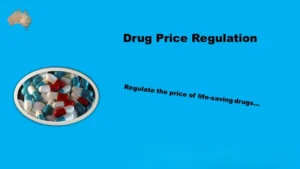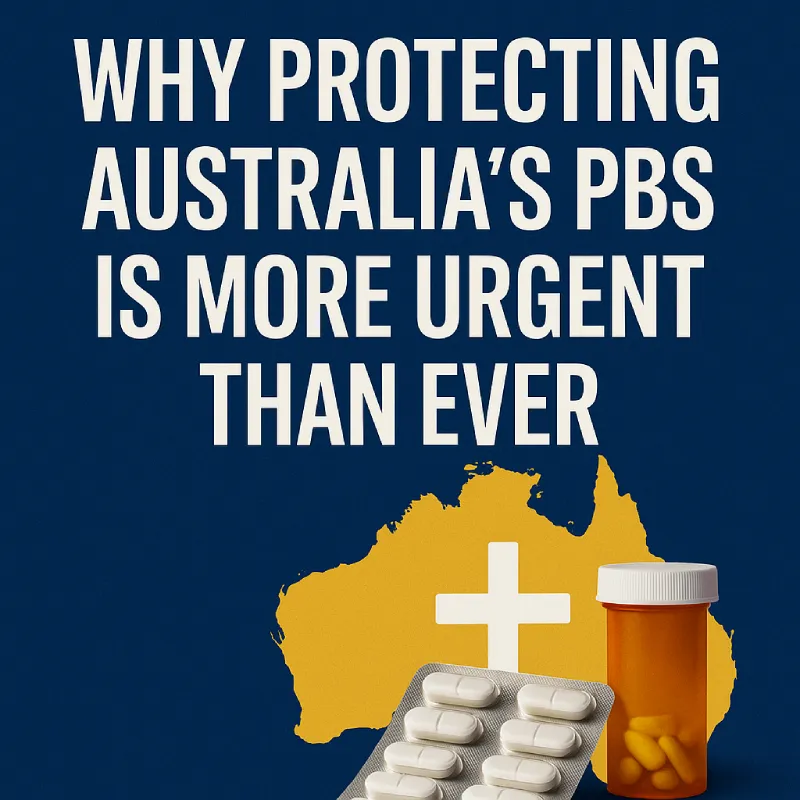Description
Protecting our PBS is urgent. US executive orders impact Australia’s PBS listings. Explore alternative sources of medication from China and India to ensure supply stability.
Introduction: When Politics Delays Your Prescription
Location: Brisbane, 2025.
Cheryl, a retired nurse battling multiple myeloma, had always relied on Australia’s Pharmaceutical Benefits Scheme (PBS) to access her vital medication. But one morning at her local chemist, she was told her newest treatment wasn’t available under the PBS. “It’s caught up in negotiations with the drug company,” the pharmacist said. Cheryl left empty-handed, her hands trembling more from anxiety than age.
This is not fiction. It’s the unfolding result of a foreign policy shift out of Washington — an executive order by Donald Trump, pressuring pharmaceutical giants to prioritise the US market. And Australia, despite our dollar sovereignty and world-class science institutions, is left exposed.
How did we let foreign corporate interests hold our health system hostage? And what practical steps must we take toward protecting our PBS for good?
The Problem: Foreign Pressure Is Undermining the PBS
US Executive Order Freezes Life-Saving Access
In June 2025, The Saturday Paper revealed that a Trump-era executive order led US pharmaceutical companies to halt new medicine listings on Australia’s PBS. This highlights the urgent need for protecting our PBS from global market volatility. (source)
For Australians, this means delayed access to critical medications, higher prices, and uncertainty for patients with chronic or life-threatening conditions.
The Cost of Overreliance
Australia imports more than 90% of its medicines. Many of our drugs originate from or are developed in the US. To reduce this risk, protecting our PBS must become a strategic national priority, not just a policy afterthought. This centralisation makes our pharmaceutical supply chain highly vulnerable to the decisions of foreign corporations or governments.
In the face of a health emergency or political disruption, Australians are left exposed.
Real Consequences for Real People
Thoughts and Emotions:
Imagine being told your cancer treatment is unavailable, not because it’s ineffective, but because a foreign company put profit over people. Imagine being a GP unable to prescribe the latest therapies because they haven’t been approved under the PBS due to international delays.
This isn’t hypothetical. This is happening.
Voices from the Frontline
“I have patients with autoimmune diseases waiting months to access the newest treatments. It’s heartbreaking,” said Dr. Grace Tan, a rheumatologist in Melbourne.
“We can afford to build submarines and stadiums, but we can’t afford timely medicine for our people. Something is deeply wrong,” said advocacy campaigner Julie Forrester.
Reclaiming Control Through Sovereignty and Science
Use Australia’s Dollar Sovereignty
Monetary sovereignty provides us with the tools for protecting our PBS without relying on the goodwill of private industry.
As the issuer of its own currency, the Australian Government can always afford to invest in public health. Modern Monetary Theory (MMT) clarifies that public money isn’t limited like household budgets. Our problem isn’t money. It’s political will.
We must stop pretending PBS’s affordability is tied to taxpayer revenue. It’s a policy choice — one that can and should prioritise people over profit.
Diversify Our Supply Chain: Look Beyond the US
China
China is the world’s largest producer of Active Pharmaceutical Ingredients (APIs). While geopolitical risks exist, diversifying to include China offers volume, scale, and cost efficiency.
India
Known as the “pharmacy of the developing world,” India provides high-quality generics and WHO-compliant medications. Strengthening bilateral trade with India could secure long-term access to pharmaceuticals.
Empower Public Science: CSIRO as a Pharmaceutical Pioneer
Domestic Drug Development
CSIRO is uniquely placed to spearhead a national push for medicine self-sufficiency. With its legacy in Wi-Fi, space science, and food innovation, CSIRO can apply its biomedical expertise to develop essential and generic medications.
CSIRO’s involvement in drug development would go a long way toward protecting our PBS from foreign supply disruptions.
Vaccine and Biotech Innovation
CSIRO’s work during COVID-19 highlighted its vaccine R&D capacity. It can expand this to support drug discovery and development for chronic, rare, and neglected diseases.
Strategic Resilience Planning
A CSIRO-led National Pharmaceutical Sovereignty Program could:
• Forecast supply disruptions.
• Advise on global trends.
• Guide public investment decisions.
Toward a Stronger, Independent PBS

Protecting our PBS is essential, as it remains a pillar of our healthcare system. However, foreign corporate influence is jeopardising our ability to deliver equitable access to medicine.
We can no longer wait for international companies to decide when our people get treatment.
With our monetary sovereignty, research capabilities, and public will, we possess all the necessary tools to reclaim control.
Protecting Australia’s PBS is not just possible. It’s urgent.
Q&A: Common Questions About Medication Sovereignty
Q1: Why can’t we just produce all our medicines here?
We can — but it requires long-term investment, which is politically neglected. With partnerships between CSIRO and universities, domestic production is entirely feasible.
Q2: Doesn’t the PBS already cover most medicines?
It does, but new and innovative drugs are often delayed or blocked by commercial negotiations. Patients are left in limbo while companies haggle over price.
Q3: Can dollar sovereignty really fund all this?
Yes. Australia, as a currency-issuing nation, can always fund essential services, such as healthcare. The constraint is not financial, but rather a matter of political ideology.
Reference
Exclusive: PBS listings frozen over Trump’s executive order. (Behind pay wall)
Call to Action
Have delays or denials of PBS-listed medication impacted you or a loved one?
You can help protect Australia’s PBS.
• Share this article with your community to raise awareness about protecting our PBS.
• Demand that politicians prioritise public health over corporate deals.
• Advocate for investment in CSIRO and public manufacturing.
We must act before another life is left hanging by the threads of a foreign policy decision.
Curious what others think? Please read what our readers are saying on our Reader Testimonials page.
If you found this article insightful, you can explore more on political reform and Australia’s monetary sovereignty at Social Justice Australia.
Share this article with your community to help drive the conversation toward a more just and equal society.
Click on our Reader Feedback page. Please let us know how our content has inspired you. Submit your testimonial and help shape the conversation today!
Support Social Justice Australia – Help Keep This Platform Running
Unlike corporate-backed media, we rely on our readers. If you find value in our content, please consider a small donation to help cover hosting, research, and publication.
💡 Your support helps:
• ✅ Keep this website running without corporate influence
• ✅ Fund articles that challenge the status quo
• ✅ Expand awareness of policies that affect everyday Australians
💰 Donate Now
If you value our work, please leave a quick Google Review and help others discover us.


We cannot, must not lose the PBS. I have seen what it is like in America, and if their model is the alternative … well, I shudder to think.
I had the misfortune of falling ill when in Nevada about ten years ago. I made an appointment with a doctor who had a small room in a pharmacy, signed a document to confirm I could pay for the appointment, and in I went.
For the five-minute consultation and two prescriptions for 10 days worth of medication (yes, only ten days) cost me the equivalent of AU$389. Back in Australia, all up I would have paid around $12 for the lot with a month’s worth of medications.
Here’s the kicker:
When talking to our friendly hotel receptionist about the shocking medical costs in America my wife asked her; “What happens to those people who cannot afford the medical costs?” The reception replied in a matter-of-fact sort of way; “Oh they die.”
The same could happen here.
Thank you, Michael, for sharing such a sobering firsthand account. Your experience in the U.S. is a stark reminder of what’s at stake if we allow corporate interests to erode our public health systems.
The PBS is one of the most vital pillars of our universal healthcare, ensuring no Australian has to choose between food and medicine. But as you’ve highlighted, protecting our PBS isn’t just about cost—it’s about dignity, equality, and the fundamental right to life.
When profit becomes the gatekeeper to healthcare, we risk becoming a society that only values those who can afford to survive. That chilling reply—“Oh, they die”—should galvanise all of us into action.
Let’s not wait until it’s too late. Let’s make it clear to our leaders that Australians will not tolerate the Americanisation of our healthcare system.